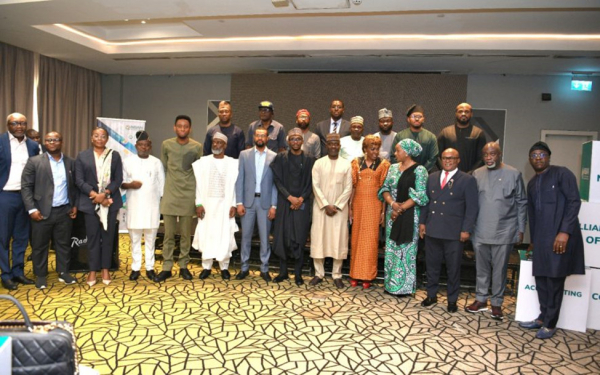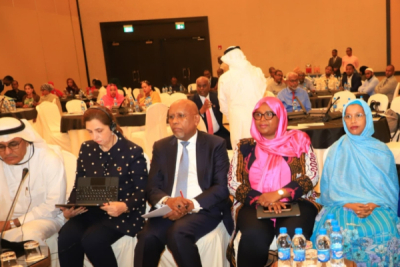Reliable internet connectivity is crucial for economic growth, education, healthcare, and innovation, particularly in remote areas with scarce terrestrial networks. By connecting underserved people to the internet, Africa can accelerate digital transformation, ensuring that more communities can participate in the global digital economy.
Satellite communications provider Eutelsat has successfully met its Partner2Connect Digital Coalition pledge - backed by the International Telecommunication Union (ITU) - two years ahead of schedule. This milestone, announced on February 5, marks the connection of 1 million underserved people in Sub-Saharan Africa to high-speed satellite internet, reinforcing Eutelsat’s commitment to bridging the digital divide and supporting the United Nations' 2030 Agenda for Sustainable Development.
Eutelsat Group CEO Eva Berneke emphasized the milestone's significance, stating: “This achievement highlights our commitment to digital inclusion and underscores how we leverage cutting-edge satellite network solutions to meet the challenging demands for low-cost, high-availability, and trusted services in Africa.”
The achievement was made possible through Eutelsat’s Konnect Wi-Fi hotspots, powered by the EUTELSAT KONNECT satellite, which has delivered affordable, high-speed internet to remote areas where traditional networks remain inaccessible. Offering speeds between 5 Mbps and 100 Mbps, the service has enabled access to education, e-commerce, healthcare, and business opportunities.
Eutelsat’s initiative aligns with global efforts to expand digital access, particularly in Africa, where only 37% of the population is online according to ITU Facts and Figures 2023. By leveraging satellite technology, the company is bridging connectivity gaps, unlocking new economic and social opportunities, and empowering communities in the digital era.
As Eutelsat continues expanding its reach, this achievement sets a strong precedent for the role of satellite internet in accelerating Africa’s digital transformation.
Hikmatu Bilali
While the global digital economy continues to grow, broadband connectivity remains a major challenge in Africa, despite its vast potential to drive development and economic opportunities.
The Federal Ministry of Communications, Innovation & Digital Economy has launched the National Broadband Alliance for Nigeria (NBAN) to accelerate broadband development and bridge connectivity gaps nationwide. The initiative was unveiled on Tuesday, February 4, 2025, in Lagos, bringing together key industry stakeholders to discuss expanding broadband access, strengthening multi-sector collaboration, and driving digital inclusion.
Dr. Aminu Maida, Executive Vice Chairman of the Nigerian Communications Commission (NCC) in an address on behalf of Minister ‘Bosun Tijani noted that despite efforts to achieve 70% broadband penetration by 2025, existing infrastructure remains underutilized. “Many of the networks remain underutilised. In numerous parts of the country, the capacity of existing fibre infrastructure far exceeds the demand,” he said.
The NBAN aims to address these challenges by expanding access, promoting awareness, and increasing investments in broadband infrastructure. The government has set ambitious targets in its National Broadband Plan 2020-2025, including 25 Mbps minimum data speed in urban areas and 10 Mbps in rural areas, 80% population coverage by 2027, and 300–500% increase in broadband investments by 2027.
The initiative is expected to unlock economic opportunities, drive innovation, and enhance Nigeria’s digital economy, ensuring broader access to high-speed internet for millions. According to the World Bank Digital Progress and Trends Report 2023, access to high-speed internet can increase an individual's likelihood of employment by up to 13.2% and boost total employment per firm by up to 22%.
Hikmatu Bilali
Blockchain, an innovative and decentralized technology, opens up vast opportunities for Africa, particularly in securing transactions and improving transparency. Exploring this technology is of strategic importance for the continent's development.
Guinea's Minister of Posts, Telecommunications, and the Digital Economy, Rose Pola Pricemou (photo), met on Monday with a delegation from cryptocurrency firm Tether Limited to discuss potential collaboration on driving innovation and technological development in the country, the ministry said.
Discussions focused on developing innovative technology solutions, promoting blockchain training, and implementing awareness programs through digital hubs. The initiative aims to foster an innovation-friendly environment and strengthen synergies among digital sector stakeholders.
The potential partnership comes as Guinea undergoes rapid digital transformation, including the imminent launch of the Cité des Sciences et de l’Innovation de Guinée (CSIG). Under construction since July, the CSIG aims to become a West African hub of excellence for innovation. The collaboration with Tether is intended to enhance blockchain understanding and promote the technology among entrepreneurs, startups, and local institutions.
A recent report by Fortune Business Insights estimated the global blockchain market at $17.57 billion in 2023, projecting it to reach $825.93 billion by 2032, representing a compound annual growth rate (CAGR) of 52.8%.
By Samira Njoya,
Editing by Sèna D. B. de Sodji
Global cooperation in space is booming, with countries sharing technology, data, and know-how. The Republic of Congo, with Kazakhstan's help, is working to boost its tech skills and better manage its resources.
The Republic of Congo and Kazakhstan signed an investment agreement on Tuesday to develop a high-resolution Earth observation satellite system, Kazakhstan’s Ministry of Digital Development, Innovation and Aerospace Industry said.
The signing ceremony, held at the ministry, was attended by representatives from JSC NC Kazakhstan Gharysh Sapary, the Kazakh space agency, and a Congolese delegation.
"In addition to the satellite platform, Kazakhstan offers a comprehensive solution, including training and knowledge transfer. Kazakhstan is strengthening its position as a center for technological development, and international partners trust our solutions. This is already the second successful export, confirming the high level of the domestic space industry," said Zhaslan Madiyev, Kazakhstan’s Minister of Digital Development, Innovations, and Aerospace Industry.
The agreement follows a joint roadmap signed on August 2, 2024, outlining strategic priorities for the collaboration and aligns with Congo’s strategy to diversify its technological partnerships and use space technology to address challenges including national security, natural resource management, agricultural monitoring, environmental protection and urban planning.
The Republic of Congo joins an international network of Earth observation satellites alongside countries like Mongolia. Once in orbit, the satellite will significantly improve forest monitoring, natural disaster management, agricultural activity tracking and urban infrastructure planning, the ministry said. The resulting data exchange and scientific cooperation will drive technological innovation, strengthening Congo’s digital sovereignty in a rapidly expanding strategic sector.
According to Mordor Intelligence, the global remote sensing satellite market was valued at $43.36 billion in 2024 and is projected to reach $76.88 billion by 2029, growing at an annual rate of 12.14% over the forecast period.
By Samira Njoya,
Editing by Sèna D. B. de Sodji
Djiboutian authorities are stepping up initiatives to transform the country into a digital hub by 2035. This includes exploring support from other countries and international organizations.
Djibouti is ramping up efforts to implement its digital transformation roadmap, with the goal of becoming a technology hub by 2035. As part of this strategy, Mariam Hamadou Ali, Minister of Digital Economy and Innovation, met with representatives from the United Nations Economic and Social Commission for Western Asia (ESCWA) during a workshop on Monday, February 3.
In recent months, Djibouti has already engaged with several countries and international organizations, including the European Union, the International Telecommunication Union (ITU), India, and Qatar. Talks with Qatar have particularly focused on developing and strengthening cybersecurity partnerships.
The government's ambitions include expanding digital services, promoting ICT adoption, and creating a favorable investment climate for the private tech sector. However, Djibouti still faces challenges in its digital development.
According to the ITU, Djibouti currently ranks 17th in Africa out of 47 countries for ICT development, with a score of 61.6 out of 100. This marks a slight decline from 2023, when the country ranked 16th with a score of 63.6. Additionally, the United Nations e-Government Development Index (EGDI) places Djibouti in the "intermediate development" category, with a score of 0.2911 out of 1. On cybersecurity, the ITU classifies Djibouti in Tier 4 out of 5, grouping it with nations that demonstrate only basic government-driven cybersecurity initiatives.
International cooperation presents an opportunity for Djibouti to leverage the expertise of more advanced nations in digital transformation. However, most discussions remain at a preliminary stage, and it remains to be seen whether they will result in concrete agreements.
By Isaac K. Kassouwi,
Editing by Sèna D. B. de Sodji
A civil engineering graduate, he chose to make sustainable transport more accessible in Africa. To achieve this, he relies on technology and promotes the adoption of electric vehicles across the continent.
Felix Rubanda (photo) is a Rwandan tech entrepreneur and the founder and CEO of Feru Energy, a startup specializing in e-mobility infrastructure across Africa.
Founded in 2022, Feru Energy aims to develop and deploy affordable and reliable e-mobility solutions for businesses and electric vehicle (EV) drivers on the continent. One of its key innovations is SafariCharger, a comprehensive charging optimization solution for electric vehicles.
SafariCharger includes a Charging Station Management System (CSMS) designed for infrastructure operators, as well as a mobile app. The CSMS provides real-time monitoring and analysis, offering detailed insights on charger usage to help operators optimize their charging networks.
The mobile app informs users about charging station availability, pricing, and locations. It also allows booking time slots and making payments via mobile money, a widely used payment method in Africa.
Rubanda is also the head of charging stations at Kabisa Electric, a Rwandan company specializing in electric mobility. In 2021, he co-founded Punda Group, a company leveraging technology to transform Africa’s construction sector. He holds a bachelor’s degree in civil engineering technologies from the University of Rwanda. Before venturing into entrepreneurship, he led Five Worlds, a Rwandan travel and tourism agency, from 2014 to 2017.
By Melchior Koba,
Editing by Sèna D. B. de Sodji
He is an entrepreneur passionate about digital innovation, especially in e-commerce, financial inclusion, and USSD technology. His work focuses on streamlining commercial transactions between merchants, suppliers, manufacturers, and retailers, making business interactions more efficient and accessible.
Amein Eskinder (photo) is an Ethiopian computer scientist and tech entrepreneur, best known as the founder and CEO of Taywan, a B2B e-commerce and financing platform.
Founded in 2020, Taywan is a digital solution designed to streamline informal trade and supply chains for merchants, retailers, and kiosks. The platform offers a comprehensive distribution network, connecting manufacturers, wholesalers, suppliers, and retailers—while also providing financing solutions for micro, small, and medium enterprises (MSMEs).
“We are not only empowering MSMEs; instead, we are aiming to create an enabling ecosystem for manufacturers, wholesalers, suppliers, and retailers so that each one of the stakeholders participates in achieving an inclusive and prosperous Ethiopia,” says Eskinder.
Today, Taywan serves 2,500 merchants, 25 agents, 25 importers, and 15 suppliers.
In addition to Taywan, Eskinder is the CEO of Cico, a startup specializing in unified Cash In, Cash Out point-of-sale solutions. Before launching Taywan, he founded HYTHEM Labs in 2017, a software research and development institute, which he led until 2022.
Eskinder holds a computer technician diploma from The Spark Academy in Ethiopia. Between 2021 and 2023, he also worked as a consultant for Hover Developer Services, a tech startup that helps Android developers integrate USSD actions from any mobile operator into their apps.
By Melchior Koba,
Editing by Sèna D. B. de Sodji
In today's digital world, AI is crucial for business growth. To remain competitive, small and medium-sized enterprises (SMEs) need to adopt these technologies, boosting both innovation and efficiency.
The General Confederation of Moroccan Enterprises (CGEM) announced, yesterday, the launch of “Génération AI: Booster 1000 PME Marocaines,” a program to help 1,000 Moroccan small and medium-sized enterprises (SMEs) adopt artificial intelligence. Developed in partnership with the European Bank for Reconstruction and Development (EBRD) and LinkedIn, the initiative will provide access to specialized AI training.
Through this program, entrepreneurs will receive LinkedIn learning licenses, enabling them to acquire essential AI skills and leverage its opportunities. In addition, several training modules will be made available, covering strategic topics such as innovation, sustainable development, and digital transformation. These individual and non-transferable licenses will remain valid until September 2025.
The initiative comes at a time when digital transformation is becoming a key driver of competitiveness for Moroccan businesses. A report published on May 30 by consulting firm PricewaterhouseCoopers (PwC) revealed that 27% of surveyed African business leaders stated their companies had already adopted generative AI, compared to a global average of 32%. The study, conducted across 105 countries, was based on a survey of 380 African executives, highlighting the continent’s relative lag in AI adoption.
By enhancing entrepreneurs’ skills, “Génération AI” aims to accelerate Morocco’s digital transformation. Supported by the Association des Femmes Entrepreneurs du Maroc (AFEM) and Technopark, the program seeks to have a significant impact on the country's business ecosystem. By facilitating AI adoption and helping SMEs upskill, this initiative could play a crucial role in integrating emerging technologies, driving growth and competitiveness for Moroccan businesses in the digital era.
By Samira Njoya,
Editing by Sèna D. B. de Sodji
Digital transformation and cybersecurity have become central to national security strategies worldwide. Strengthening ICT infrastructure and digital security capabilities can significantly enhance military operations, disaster response, and secure communication networks.
On January 30, 2025, the Director General of the Zambia Information and Communications Technology Authority (ZICTA) Collins Mbulo met with Zambia Army Commander Lieutenant General Geoffrey Choongo Zyeele to explore areas of collaboration, focusing on ICT infrastructure, cybersecurity, and digital solutions for military and national defense needs.
Lt. Gen. Zyeele welcomed the strong partnership between the two institutions, emphasizing the need for proactive collaboration in tackling national security challenges in an increasingly digital world. “I have no doubt that your institution shall continue to positively impact on my organisation’s achievement of my vision towards modernisation in this technological environment,” he said.
The Zambia Army Commander also urged ZICTA to encourage mobile network providers to expand coverage in areas where the Army has a significant presence, improving communication and operational efficiency.
To further strengthen cooperation, Engr. Mbulo proposed establishing regular communication channels for knowledge-sharing on spectrum management and cybersecurity, ensuring both institutions are equipped to address emerging digital threats.
The World Bank’s Digital Economy Diagnostic Report highlights Zambia's notable progress in digital transformation, particularly in digital infrastructure, financial services, and platforms. As the country advances technologically, the Zambia Army's participation in digital initiatives is expected to accelerate the adoption of advanced technologies in defense operations, enhancing national security and operational efficiency.
The collaboration between ZICTA and the Zambia Army highlights the growing intersection of ICT and national security, reinforcing Zambia’s commitment to leveraging technology for defense, connectivity, and digital innovation.
Hikmatu Bilali
A group of tech entrepreneurs launched Aftown Music to support African artists. Starting in Ghana, the company recently expanded into Cameroon and is now eyeing further expansion into Francophone Africa.
Aftown Music is a music streaming and download platform developed in 2016 by a Ghanaian startup. It allows artists and podcasters to distribute their content and earn revenue. The platform offers a mobile app available on iOS and Android, where it has already been downloaded more than 5,000 times, according to Play Store data.
Through the app, users can sign up for an account and stream music from various artists on their smartphones or PCs. It has A free, ad-supported version, along with a premium, ad-free subscription. The platform features a wide range of genres, including Makossa, Bikutsi, Afrobeats, Amapiano, Gospel, and Highlife. In addition to streaming, it offers functionalities such as offline mode and a rewards system.
Headquartered in Accra, Ghana, Aftown Music announced on Monday, February 3, 2025, its expansion into Francophone Africa, starting with Cameroon. The move was made in collaboration with Cliq Empire, a local entertainment center and creative agency.
“We are thrilled to be working with Aftown Music to launch their operations in Cameroon. [...] his partnership is a game-changer for Cameroonian artists. It’s about time that local creatives had a platform that prioritizes their growth and ensures they receive fair compensation for their work,” said Prince Michael Enobi, director of Cliq Empire.
By Adoni Conrad Quenum
Editing by Feriol Bewa
More...
Leveraging technology can accelerate Africa’s development, ensuring digital inclusion, economic resilience, and global competitiveness. Nigeria's leadership in connectivity and AI will likely inspire similar initiatives across the continent, positioning Africa as a key player in the Fourth Industrial Revolution.
The Federal Executive Council (FEC) has approved two major initiatives under the Federal Ministry of Communications, Innovation & Digital Economy (FMCIDE) to accelerate Nigeria’s digital transformation. This was during the council meeting on February 4, which was chaired by President Bola Tinubu.
The Minister of Communications, Innovation & Digital Economy Bosun Tijani remarked, “Access to connectivity is something many of us take for granted. Expanding mobile coverage through additional base stations will significantly improve the quality of life for millions of Nigerians in underserved regions.”
The first approval establishes the Nigeria Universal Communication Access Project under a Public-Private Partnership (PPP) funding model. This initiative aims to connect over 21 million people across 4,834 rural and underserved communities that currently lack basic mobile communication access. The project complements Project Bridge, Nigeria’s 90,000km Fibre Fund, by expanding connectivity to remote areas, improving digital inclusion, and enhancing economic opportunities for millions.
The second approval supports Nigeria’s ambition to become a global leader in Artificial Intelligence (AI) through the creation of the National AI Trust - a pioneering initiative designed to mobilize resources, provide oversight, and guide AI development across key economic sectors.
The National AI Trust, the first of its kind globally, will consist of 10 AI experts, the Minister of Communications, Innovation & Digital Economy, and the Minister of Science, Innovation & Technology. The Trust will play a strategic role in shaping Nigeria’s AI landscape, future-proofing investments, driving job creation, and attracting foreign direct investment (FDI).
According to DataReportal’s Digital 2024: Nigeria, only 45.5% of Nigerians have internet access, leaving a large segment of the population unconnected. The Nigeria Universal Communication Access Project seeks to close this gap by bringing connectivity to people in underserved communities and fostering digital inclusion and economic growth.
In parallel, the National AI Trust reinforces Nigeria’s ambition to lead in artificial intelligence. According to the National Artificial Intelligence Strategy, Nigeria’s AI market is expected to grow to $434.4 million by 2026, with a CAGR of 44.2%, highlighting the sector’s rapid expansion and potential.
These initiatives align with Nigeria's broader digital economy goals, aiming to enhance connectivity, foster innovation, and ensure inclusive growth across the nation. By prioritizing Connectivity Infrastructure and Artificial Intelligence, Nigeria is positioning itself at the forefront of Africa’s digital transformation.
Hikmatu Bilali
To address challenges in accessing educational resources and modernize teaching methods, some countries are investing in digital technology. This tech integration aims to improve learning outcomes, build stronger skill sets, and foster innovation, which are all crucial for economic competitiveness.
On Monday, February 3, Guinea’s Prime Minister Amadou Oury Bah officially presented 1,000 laptops to students from the country’s public universities. This initiative, supported by MouNa Group Technologies in partnership with the Ministry of Higher Education, Scientific Research, and Innovation, aims to enhance student access to digital tools and promote technological progress in Guinea's education sector.
"The transformation we are initiating today must go hand in hand with a change in mindset. Our students must use these tools to gain knowledge, not just for entertainment. The future of our country depends on our ability to train talents that align with global technological advancements. That is why we will accelerate the development of the Higher Institute of Technology in Mamou, with the ambition of producing computers locally and achieving digital autonomy," the Prime Minister stated.
This initiative is part of the Simandou Academy, a key element of the Simandou 2040 project launched by President Mamadi Doumbouya. The program aims to position Guinea as a hub for research and innovation, addressing challenges related to sustainable development and technological sovereignty. According to Amadou Oury Bah, 2,200 primary schools across the country will soon incorporate digital tools into their teaching methods. Beginning with primary education, students will use tablets to access learning materials, ensuring they meet international educational standards.
By investing in digital education, Guinea is laying the groundwork for a more modern and inclusive education system while equipping its youth with the skills necessary to thrive in the digital economy. This commitment to innovation and digital competency represents a strategic asset for the country’s sustainable development and global competitiveness.
By Samira Njoya,
Editing by Sèna D. B. de Sodji
Internet and social media shutdowns have become a trend in Africa during times of political or social unrest. These restrictions, often justified as necessary for security, raise serious concerns about freedom of expression and their negative economic consequences.
Residents of several Congolese cities have experienced disruptions to social media access, including TikTok and X, since Saturday, February 1. While no official statement has confirmed the restrictions, many believe they are linked to the tense situation in the country's eastern region and aimed at limiting information flow.
Disruptions have been reported in major cities, including Kinshasa, Goma, Bukavu, and Lubumbashi. Many users have been unable to connect to the platforms, while others have used virtual private networks (VPNs) to bypass the restrictions. NetBlocks, an internet monitoring organization, said data indicates a targeted restriction on social media and app download platforms, making VPN access more difficult.
The restrictions coincide with increased tensions in the DRC. The government accuses some of using social media to spread misinformation or incite unrest, while civil society organizations condemn the measures as an attack on freedom of expression.
The DRC joins several other African governments that have imposed internet restrictions during political or security crises. According to the Global Cost of Internet Shutdowns report, published in January by Top10VPN, a UK-based platform, Sub-Saharan Africa lost nearly $1.5 billion in 2024 due to internet shutdowns, social media blockages, and bandwidth throttling. Beyond direct economic losses for digital businesses and freelancers, these restrictions hinder online transactions, disrupt supply chains, and impact key sectors like e-commerce and digital services.
By Samira Njoya,
Editing by Sèna D. B. de Sodji
He began his entrepreneurial journey in 2019 while still a student, developing technological solutions to accelerate digital transformation in Africa.
Cirus Sumika, a Ugandan tech entrepreneur, is the founder and CEO of Sumic IT Solutions, a startup dedicated to narrowing Africa’s digital divide by providing sustainable technology solutions.
Founded in 2019, Sumic IT Solutions specializes in building professional websites for businesses, NGOs, hotels, and educational institutions, among others. The company also develops mobile applications, handling the entire process from ideation to delivery while offering ongoing support. Additionally, it provides digital marketing services, IT consulting, and training in new technologies.
"Our core mission is to facilitate the growth and self-sufficiency of businesses by providing them with affordable, standard, and sustainable technologies. We achieve this through a range of services including Website Design & Development, Domain Name Registration & Hosting, Mobile Application Development, Digital Marketing, IT Trainings, and IT Consulting," the startup states.
Sumic IT Solutions operates under Sumic Group, founded by Sumika, which also launched Sumic Online, a platform that facilitates buying and selling various products and services.
Sumika holds a bachelor’s degree in computer science from Makerere University, Uganda, which he earned in 2021. In 2020, he interned as an accountant at KPMG East Africa. Between 2023 and 2024, he was a partner at Black Leaders Worldwide, a business network for Black professionals in the U.S. and the U.K.
His achievements include winning the Startup of the Year in Technology award at the 2022 Startup Uganda Awards. In 2023, Sumic IT Solutions received the Global Recognition Award. Most recently, in 2024, Sumika was named Young Entrepreneur of the Year by the Private Sector Foundation Uganda, the country’s top private sector body.
By Melchior Koba,
Editing by Sèna D. B. de Sodji















